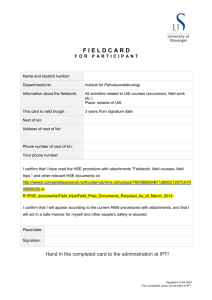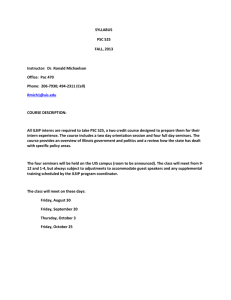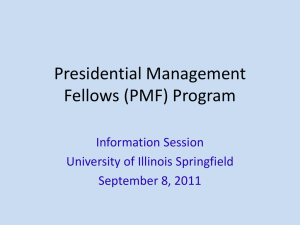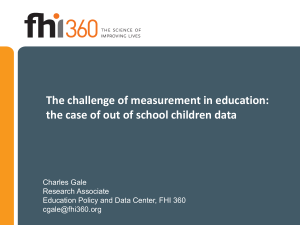Spring 2016 ECCE Speaker Series Events Schedule
advertisement
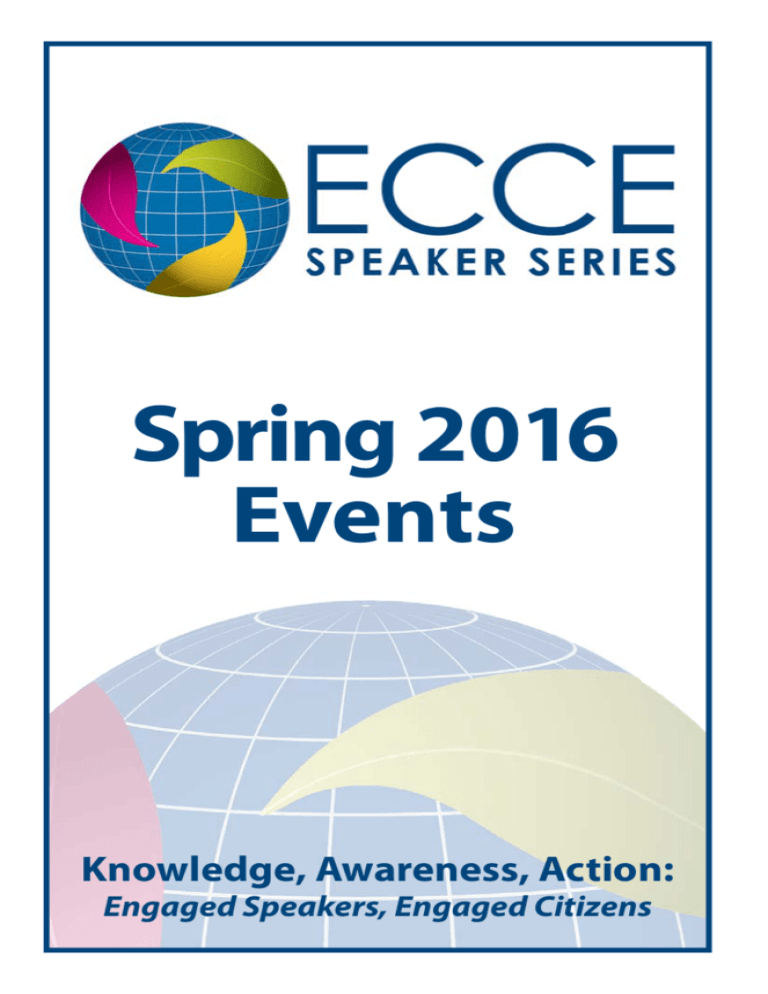
Spring 2016 Events Knowledge, Awareness, Action: Engaged Speakers, Engaged Citizens ECCE SPEAKER SERIES Spring 2016 Schedule Feb 3 adrienne maree brown: Transformative Social Justice through Radical Science Fiction Feb 9 Alison Bailey: What's Wrong with White Talk? Feb 15 A Showcase Symposium: Black Lives Matter Featuring Students from UIS Feb 25 Hinda Seif and Dexter Burns: Afro-Latinos: Status and Struggle Mar 3 Jill St ein: Working For Our Political Environmen t and Personal Health Mar 7 Kamau Kemayo & Richard Gilman-Opalsky: The Black Power Mixtape Mar 24 Mitch Pugh: A Call to Action: Local Media's Role in Shaping Public Policy M ar 30 Dean Alexander: /SIL-finked Operatives in the United States and Their Implications Apr 4 Lauren J. Silver: Social Welfare, Young Mothers, and the Failure of the System: Engaging and Changing Urban Bureaucracies Apr 6 Kyle Simpson : From Capital Scholar to Capitol Hill: My Education in Violence Against Women Legislation Apr 15 Danielle Evans: Before You Suffocate Your Own Fool Self: Fiction about African American and Bi-Racial Experience in Contemporary America Apr 22 Esau Melendez: Immigrant Nation! Apr 27 Roger-Mark De Souza : Our Turn to Lead: Paving the Way for A Resilient, Secure and Sustainable Future February 3 Wednesday 6:00 p.m. Brookens Auditorium Transformative Social Justice through Radical Science Fiction adrienne maree brown Co-sponsored by UIS New Voices on Racial Justice Series, UIS College of Arts and Sciences, UIS Diversity Center, and UIS Student Activities Committee Radical science fiction creates space for us to envision socially just worlds filled with alien identities, intersectionalities, and power relations, and also to inspire, organize, and think strategically about social movements in our own world, especially when the stories speak to racism and other oppressions in our society. Thus construed, science fiction becomes a transformative tool, which Walidah lmarisha and adrienne maree brown, co-editors and activists, understood when they brought to fruition Octavia's Brood: Science Fiction Stories from Social Justice Movements, a collection inspired by Octavia Butler's work. To share the exciting ways that science fiction affects real world outcomes, adrienne maree brown reads Octavia's Brood excerpts focused on social justice issues around race and other identities; discusses a brief history of science fiction as a voice for marginalized and oppressed persons; and, provides examples that employ science fiction to pursue social justice today. This event is part of the UIS New Voices on Racial Justice Series organized by Dr. Roxanne Kurtz, UIS Philosophy Associate Professor. adrienne maree brown is a writer, organizer, activist and strategist. Currently a Kresge Literary Arts Fellow, she's written for Africana (now Black AOL), Wiretapmag.org, Alternet.org, HuffingtonPost.com, Feministing.com, Washingtonpost.com, Racewire.org, Left Turn; Race, Poverty and Ecology; Yes; and her own blog. Through these and other venues, she has been working to demonstrate the relevance of Octavia Butler's revolutionary work on social justice through workshops and strategic readers for the past several years. She approaches Octavia's work through the lens of emergent strategy - strategies rooted in relationship, adaptability, and embracing change. Adrienne started writing at age 2 and it has remained her first passion and throughout an incredible journey of social j ustice and movement facilitation. 1 February 9 Tuesday 6:00 p.m. Brookens Auditorium What's Wrong with White Talk? Alison Bailey Co-sponsored by UIS New Voices on Racial Justice Series and UIS Department of Philosophy replace White Talk with open vulnerable discussions to better see the problems of, and possible solutions to, injustice caused by white privilege. Be better anti-racists - While rejecting racism, recognizing shared experiences, and praising equality, sound great, White Talk can shutdown important conversations. As Dr. Alison Bailey explains, it steers discussion toward the moral goodness of the speaker and away from white privilege, effectively defending the speaker from vulnerabilities like feeling like a participant in privilege or absorbing painful testimony about its harms. Bailey suggests that rather than defend against these vulnerabilities, a better response is to use their power to become open to understanding privilege and to motivate change. Further, she gives us concrete guidance on how speakers can break their patterns of White Talk to be better anti-racists. This event is part of the UIS New Voices on Racial Justice Series organized by Dr. Roxanne Kurtz, UIS Philosophy Associate Professor. Dr. Alison Bailey directs the Women's and Gender Studies Program at Illinois State University where she is also a professor of philosophy. Her research addresses issues at the intersections of feminist theory, moral and political philosophy, philosophy of race/wh iteness studies, and epistemology. Concerns for social justice drive her selection of philosophical problems, which she then works through by appealing to " real life" examples taken from narratives, social science research, and public policy. She recently co-edited a special issue of Hypatia on "The Reproduction of Whiteness: Race and the Regulation of the Gendered Body," with Jacquelyn N. Zita. Her recent work on philosophical issues related to racism and resistance has appeared in Hypatia, Whiteness: Feminist Philosophical Perspectives, Feminist Ethics Revisited, and Race and Epistemologies of Ignorance. She and Chris Cuomo have just co-edited The Feminist Philosophy Reader. Her current research interests include race in feminist bioethics, and philosophical responses to intersectionality. 2 February 15 Monday 6:00 p.m. Brookens Auditorium A Showcase Symposium: Black Lives Matter Featuring Students from UIS Co-sponsored by UIS Diversity Center Black History Month Event Black Lives Matter is an ideological and political intervention in a world where Black lives are systematically and intentionally targeted for demise. It is an affirmation of Black folks' contributions to this society, our humanity, and our resilience in the face of deadly oppression. blacklivesmatter.com UIS students will connect the Black Lives Matter movement to ECCE themes. These themes include how participation in this movement helps them to recognize their own social responsibility toward a larger community of people, Black people. Th e essay presentations will provide a greater awareness of and respect for the difficult issues facing Black and African-American peoples in this country by literally taking action through engagement with us in this showcase symposium. Student finalists will be selected in advance to present their prewritten essays in creative forms such as rap, lecture, slam poetry, slides, etc. A brief synopsis of the finalist essays will be read to the audience before the presentations. Essays are due Friday, January 29, 2016 to diversity@uis.edu. Finalists announced Friday, February 5, 2016. These student essays will be determined by a committee of faculty and local leaders. The winner(s) of the event will be determined by audience vote and will receive a UIS Bookstore gift certificate: Winner: $500; Finalist 2-$250, Finalist 3-$100. Complete information and essay criteria are available at www.uis.edu/diversitycenter. February 25 Thursday 4:00 p.m. Brookens Auditorium Afro-Latinos: Status and Struggle Hinda Seif and Dexter Burns Co-sponsored by UIS Diversity Center, UIS Office of the Associate Chancellor for Access and Equal Opportunity, UIS Sociology and Anthropology Department, UIS Black Student Union, and UIS Organization of Latin American Students 3 Black History Month Event More Africans were transported as slaves to Latin America and the Caribbean than what is now the United States, yet few depictions of Afro -Latinos appear as representative images in popular culture and media in the U.S. or Latin America. To some observers, this relative absence is the result of a preference for European or multi-racial representations rather than African or indigenous depictions. This presentation will examine the complex intersections of race, culture, and country through an excerpt of the PBS documentary film "Mirrors of the Heart" that focuses on questions of identity in Hispaniola after Spain and France brought Africans as slaves to this island after wiping out its indigenous peoples. The presentation will also discuss racialization in the Dominican Republic as it relates to Latinos in Haiti and the U.S., including their distancing from African and Black identity in dominant culture, as well as activists' reclaiming of African and Black identity. The status and struggles of AfroLatinos in Bolivia will also be presented. Dr. Hinda Seif is a faculty member in Sociology/Anthropology and Women and Gender Studies at UIS. Professor Seif's scholarship includes work on race/ethnicity and Latino Studies; she teaches several courses on cultural and social diversity and has served as advisor to the UIS Organizational of Latin American Students. Dexter Burns is a 2014 graduate of UIS, where he earned a bachelor's degree in Global Studies. Dexter is currently a Master's degree candidate in the Latin American and Caribbean Studies Program at the University of Illinois at Urbana-Champaign; his research interests include U.S./Latin America relations and Afro -Latino history and culture. While at UIS, Dexter studied abroad in Mexico and Peru; he has also spent time in Bolivia and other countries in that region, exploring the lives and issues faced by those of African descent in Latin America. March 3 Thursday 6:30 p.m. Studio Theatre Working For Our Political Environment and Personal Health Jill Stein Co-sponsored by UIS College of Public Affairs and Administration The current US political system produces policy priorities that do not match real needs: most people are threatened by heart disease, cancer, and other physical health threats; yet, the total public and private spending seeking cures for and prevention of these threats are dwarfed by military spending. We want abundant and inexpensive energy, food, and goods, yet the production of most of these produces toxic pollution 4 that threatens our health and lives. This event will provide a candid discussion of our need to change our political system, while protecting our environmental and personal health. Dr. Stein will share her ideas on how we can overcome our system's dysfunctions and her insights on our environmental and health needs for a safe, sane, and secure future. She will highlight the roles each of us can pursue toward solving societal problems through our professional work, community engagement and activism, and political activity. Dr. Jill Stein is a political organizer, physician, and pioneering environmental-health activist. She is the co-author of two widely-praised reports, In Harm's Way: Toxic threats to Child Development (2000), and Environmental Threats to Healthy Aging (2009). As a local and national activist, she has led multiple initiatives promoting healthy communities and local green economies and actively organized critical issues around economic, health, environmental, and racial justice. In 2013, Dr. Stein cofounded the Global Climate Convergence for People Planet and Peace over Profit, and she previously served on the Massachusetts and national boards of directors for Physicians for Social Responsibility, where she worked on environmental health and nuclear disarmament issues. Jill Stein was the Green Party's 2012 candidate for President of the United States, and is again seeking that Party's presidential nomination in the 2016 election. Jill was raised outside Chicago, Illinois. She graduated magna cum laude from Harvard College in 1973, and from Harvard Medical School in 1979. Photo from: http://www.jill2016.com/press. The views and opinions of the presenter do not necessarily represent or reflect those of the University of Illinois. Allowing the use of this venue shall not be construed as an endorsement by the University of the presenter or any products or services offered by the same. The University of Illinois does not endorse any political candidate or political organization. March 7 Monday 6:00 p.m. Brookens Auditorium THE BLACK POWER MIXTAPE Kamau Kemayo & Richard Gilman-Opalsky Co-sponsored by Political Art and the Public Sphere and UIS African -American Studies The Black Power Mixtape is a 2011 documentary film, directed by Goran Olsson, that examines the U.S. Black Power Movement, featuring found footage shot by a group of Swedish journalists (discovered some 30 years later in the cellar of Swedish Television) 5 overlaid with commentaries and interviews from contemporary African-American artists, activists, musicians and scholars. The footage includes appearances by Stokely Carmichael, Dr. Martin Luther King, Jr., Eldridge Cleaver, Bobby Seale, Huey P. Newton, Emile de Antonio, Angela Davis and commentaries by Erykah Badu, Talib Kweli, Harry Belafonte, Kathleen Cleaver, Angela Davis, Robin Kelley and Abiodun Oyewole, amongst others. The contemporary commentary in the fi lm aims to connect problems of racism from over 40 years ago to a present-day analysis, which we will take up in light of the most current issues of racia l profiling and black revolt in the US today. The open discussion after the fi lm will be moderated by Kamau Kemayo, Associate Professor of African-American Studies at UIS, and Political Art and the Public Sphere (PAPS) series founder, Richard Gilman-Opalsky (Political Science). As part of the PAPS series, the open discussion, and NOT the film itself, is the "main event." Photo from: http://blackthen.com/the-black-power-m ixtape-the-black-power-movementthrough-the-eyes-of-swedish-journalists/. March 24 Thursday 4:00 p.m. Brookens Auditorium A Call to Action: Local Media's Role in Shaping Public Policy Mitch Pugh Sponsored by the Chancellor's Office and UIS Department of English and Modern Languages Co-sponsored by UIS Departments of Communication and Women and Gender Studies, and UIS Women's Center Engaged local news media can play important role in driving public debate and, ultimately, public policy. But as newsrooms across America shrink, especially in local markets, the expensive and time-consuming art of investigative, watchdog and public service journalism has clearly diminished. The resu lt has been fewer eyes watching the halls of power and government officials who are increasingly hostile to the public's responsibility, through the press, to hold them accountable. The challenges to local news organizations are both established (the economics of the local media ecosystem) and emerging (the rise of social media and mobile news habits). Yet, there is hope as privately held, locally owned news organizations have begun reversing the trend and investing in investigative journalism. Drawing upon examples from The Post and Courier's Pulitzer Prize-winning series about domestic violence, "Till Death Do Us Part," Pugh will argue about the importance of local media in social change. 6 Mitch Pugh is the executive editor of The Post and Courier, winner of the 2015 Pulitzer Prize for Public Service. In his time as editor in Charleston, S.C., the paper has won several prestigious journalism awards including the George Polk Award, Silver Gavel Award, the 2015 John Jay College/Harry Frank Guggenheim Award and the American Society of News Editors' Local Accountability Award. A native of Riverton, Illinois, he has been the editor of newspapers in Colorado, Iowa, and Missouri. He graduated from the University of Illinois-Springfield with a degree in English. He lives in Mount Pleasant, S.C., with his wife and son. March 30 Wednesday 7:30 p.m. Brookens Auditorium /SIL-linked Operatives in the United States and Their Implications Dean Alexander Sponsored by World Affairs Council of Central Illinois We know that the Islamic State has beheaded scores of captives and claimed responsibility for recent terrorist attacks in Paris and Nigeria. We understand that they could topple governments in Syria and Iraq. We are aware that the Islamic State is recruiting members from the United States. However, do we really know who the members of the Islamic State are, what motivates them, and who is leading it? Can the Islamic State be defeated by military power, or is another strategy needed? How can we limit the flow of recruits to the Islamic State and prevent attacks by this group on our soil? Renowned expert on terrorism and security, Dean Alexander, who recently wrote The Islamic State: Combating the Caliphate Without Borders, will answer these questions and others at his presentation on the Islamic State. Dean Alexander is a professor of Criminal Justice and the Director ofThe Homeland Security Research Program at Western Illinois University. He has lectured about terrorism and security to NATO, U.S. State Department, Illinois State Terrorism Unit and many other organizations. Dr. Alexander has also consulted for the Organization of American States, the World Bank, and a number of companies. He has written numerous journal articles and books about terrorism and security. His most recent books are The Islamic State: Combating the Caliphote Without Borders (2015) and Business Confronts Terrorism: Risks ond Responses (2004). Dr. Alexander has law degrees from Georgetown University Law Center (LL.M.) and American University, Washington College of Law (J.D.). 7 April 4 Monday 6:00 p.m. Brookens Auditorium Social Welfare, Young Mothers, and the Failure of the System: Engaging and Changing Urban Bureaucracies Lauren J. Silver Co-sponsored by UIS Departments of Women and Gender Studies, Sociology and Anthropology, African-American Studies, and College of Education and Human Services The social welfare system can be a difficult bureaucracy to negotiate for both those people who are dependent on it and their caseworkers. It can be especially problematic for adolescent mothers. Often labeled dependent and delinquent, these women, mostly African Americans, become wards of the state and must negotiate the silos of the welfare system to get help for themselves and their children. Lauren Silver explores the frustrations and ingenuity of these young women, illuminating the way restrictive public policies and confusing bureaucracies help perpetuate poverty, violence, and racial segregation. Dr. Silver will help her audience resist "media and scholarly representations that decontextualize and stereotype marginalized young people as flat, culturally deficient characters who act in violent and deceitful ways that white, middle-class citizens cannot understand." Her commitment to social justice leads Dr. Silver to suggest ways her audience can participate in changing the system. Dr. Lauren Silver is Associate Professor of Childhood Studies and an Affiliated Scholar of the Center for Urban Research and Education at Rutgers University-Camden. She holds an interdisciplinary Ph.D. in Education, Culture, and Society from the Graduate School of Education at the University of Pennsylvania. The topic for her lecture derives from her book, System Kids: Adolescent Mothers and the Politics of Regulation, published in 2015 by University of North Carolina Press. She is a recipient of the Chancellor's Award for Academic Civic Engagement, a Digital Teaching Fellowship, a Dean's Recognition for Mentoring Undergraduate Research and Presidential Fellowship for Teaching Excellence all at Rutgers-Camden. April 6 Wednesday 6:00 p.m. Brookens Auditorium From Capital Scholar to Capitol Hill: My Education in Violence Against Women legislation Kyle Simpson 8 Sponsored by UIS Women's Center Co-sponsored by Capital Scholars Honors Program and Student Government Association Kyle Simpson, UIS Class of 2007, will speak on his role working on a legislation to address and reduce violence against women and end college sexual violence. He will also discuss the history of such legislation in the United States. He will relate his work on violence against women issues to how his education from UIS paved the way for providing himself with the knowledge and experience that led him to his work in Capitol Hill, including his current position as legislative aide for US Senator Claire McCaskill. Kyle Simpson is a 2007 graduate of the Capital Scholars Honors Program at University of Illinois Springfield. After serving Congressman Phil Hare, he continued to work in politics for Illinois Congressman Bill Foster and US Senator Claire McCaskill. His experiences, both from his UIS education and his work on Capitol Hill have brought him close to both national issues and local concerns. April 15 Friday 7:00 p.m. Brookens Auditorium Before You Suffocate Your Own Fool Self: Fiction about African American and Bi-Racial Experience in Contemporary America Danielle Evans Co-sponsored by Brookens Library Award -winning fiction writer Danielle Evans will read from her debut collection of short stories, Before You Suffocate Your Own Fool Self. These stories focus on African American and Bi-racial experience in contemporary America, with stories set in the South and in the Northeast. Her stories consider the ways in which race, education, gender and (popular) culture impact the emotional lives of--and opportunities available to--individuals and communities. Danielle Evans is the author of the short-story collection Before You Suffocate Your Own Fool Self, which was a co-winner of the 2011 PEN American Robert W. Bingham Prize for a first book, a National Book Foundation S under 35 selection for 2011, the winner of the 2011 Paterson Prize for Fiction and the 2011 Hurston-Wright award for fiction, and an honorable mention for the 2011 PEN/Hemingway award. It was named one of the best books of 2010 by Kirkus Reviews and 0 Magazine, and longlisted for The Story Prize. She received an MFA in fiction from the Iowa Writers Workshop, was the 2006-2007 Carol Houck Smith fellow at the Wisconsin Institute for Creative Writing, taught literature and creative writing at American University in Washington 9 DC, and now teaches in the Creative Writing Program at the University of Wisconsin, Madison. Photo by Nina Subin. April 22 Friday 4:00 p.m. Brookens Auditorium Immigrant Nation / Esau Melendez Co-sponsored by Chicano Latino Male Society and Cygnets Immigrant Nation! is a story of Elvira Arellano, a figurehead for the immigration reform movement, and her one-year asylum in a church sanctuary to avoid deportation in 2006-2007. It is meant to humanize the issue of immigration reform and help people understand the struggles of undocumented individuals and the issues they face. The film won several awards in 2010 including " Best Documentary" at the Chicago and San Antonio film festivals, and continues to be relevant today as the issue of immigration reform remains on the forefront of the U.S. political scene. Esau Melendez, the film's director and producer, will lead a Q&A following the screening. Esau Melendez emigrated from Mexico City where he spent most of his childhood, and presently lives in Chicago with his fami ly. He has been involved in fi lm and TV production for the past 10 years, working as a director, producer, cameraman and editor. He studied film & video at Columbia College in Chicago, and soon after began working with the Spanish Broadcast Network, Telemundo, and WYCC, a Chicago PBS affiliate. He has also directed award winning short fi lms "El Solo in a New City" and "Escucha!" Melendez has directed and produced various commercials and music videos with his production company, Clandestino Films. His passion has always been to tell stories regarding social issues that affect the Hispanic community. Immigrant Nation!: The Battle for the Dream, is Melendez' first feature fi lm. Photo from: https://www.newday.com/filmma ker/100. 10 April 27 Wednesday 7:30 p.m. Brookens Auditorium Our Turn to Lead: Paving the Way for A Resilient, Secure and Sustainable Future Roger-Mark De Souza Co-sponsored by Julia Henderson Fund, World Affairs Council of Central Illinois, and UIS Sustainability Committee Earth Week 2016 Keynote Address Focusing on ways we can build our resi lience to natural and human-made shocks and stresses by investing in youth, women and communities, De Souza will explore how integrating concepts like women's empowerment, reproductive health, community engagement and food security can lead to better policy and actions that help us cope with adversity. He will present innovators who are developing new ideas and models of social change to address global and local sustainability in countries such as Ethiopia, Nepal and Tanzania. By sharing stories of some of these remarkable innovators, he will discuss the surprising ways that the broader integration of sustainability and conservation practices and policies can open the door to a resilient, secure and sustainable future. Roger-Mark De Souza is the director of population, environmental security, and resi lience for the Wilson Center. He leads programs on climate change resilience, reproductive and maternal health, environmental security, and livelihoods, including the Global Sustainability and Resilience Program, Environmental Change and Security Program, and Maternal Health Initiative. Before joining the Center in 2013, De Souza served as vice president of research and director of the climate program at Population Action International. From 2007 to 2010, he served as the director of foundation and corporate relations at the Sierra Club, and before this, he directed the Population, Health, and Environment Program at the Population Reference Bureau for 10 years, where he designed and implemented projects in the United States, Africa, Southeast Asia, and Latin America and the Caribbean. De Souza holds graduate degrees in international relations and development policy from George Washington University and the University of the West Indies. This event is funded by the Julia Henderson Fund. Dr. Henderson, who distinguished herself through her academic success and public service, including many years working at the United Nations, created this fund to support fellowships, forums to encourage intelligent discourse in support of controversial but important ideas, and concern for methods to improve the analysis and delivery of vital governmental services Photo from: https://www.wilsoncenter.org/person/roger-mark-de-souza. 11 Propose a Speaker Series Event We are accepting proposals for Fall 2016 until April 1, 2016. The ECCE Speaker Series welcomes proposals from students, faculty, staff, student organizations, community members and community organizations. Faculty and staff may submit proposals directly to the Program Coordinator. Students and community members should work with a UIS staff or faculty cosponsor. The ECCE Speaker Series does not accept direct solicitations from speakers or their agents. All proposals will be reviewed by the Office of Undergraduate Education based on the proposed event's relevance to the ECCE Curriculum. Those proposals with strong t ies to the ECCE Curriculum will be forwarded to a subcommittee of the General Education Council for review, discussion and approval. Please submit your proposal to Kimberly Craig, Interim ECCE Speaker Series Academic Program Coordinator, via email at kcraiOls@uis.edu or regular mail to ECCE Speaker Series Office of Undergraduate Education University of Illinois Springfield One University Plaza, MS PAC 525 Springfield, IL 62703-5407 Our proposal form and instruction sheet are available on our website: www.uis.edu/speakerseries/propose/. For questions, please contact Kimberly Craig. 12 ECCE SPEAKER SERIES The ECCE Speaker Series is administered by the Office of Undergraduate Education. Speakers and events are chosen based on their relationship to the ECCE themes, which are: • Recognizing the social responsibility of the individual within a larger community • Practicing awareness of and respect for the diversity of cultures and peoples in this country and in the world • Reflecting on the ways involvement, leadership, and respect for community occur at the local, regional, national, or international levels • Identifying how economic, political, and social systems operate now and have operated in the past • Engaging in open-minded and ethical decision-making and action • Distinguishing the possibilities and limitations of social change. LEADERSHIP iVe For more information regarding the ECCE Speaker Series or to join our mailing list for updates on our events, e-mail us at speakerseries@uis.edu. UIS ECCE Speaker Series One University Plaza, MS BRK 482 Springfield, IL 62703-5407 Website: www.uis.edu/speakerseries Phone: (217) 206-8507 E-mail: speakerseries@uis.edu l l www.facebook.com/ECCESpeakerSeries ~ www.twitter.com/ECCESpkrSeries
